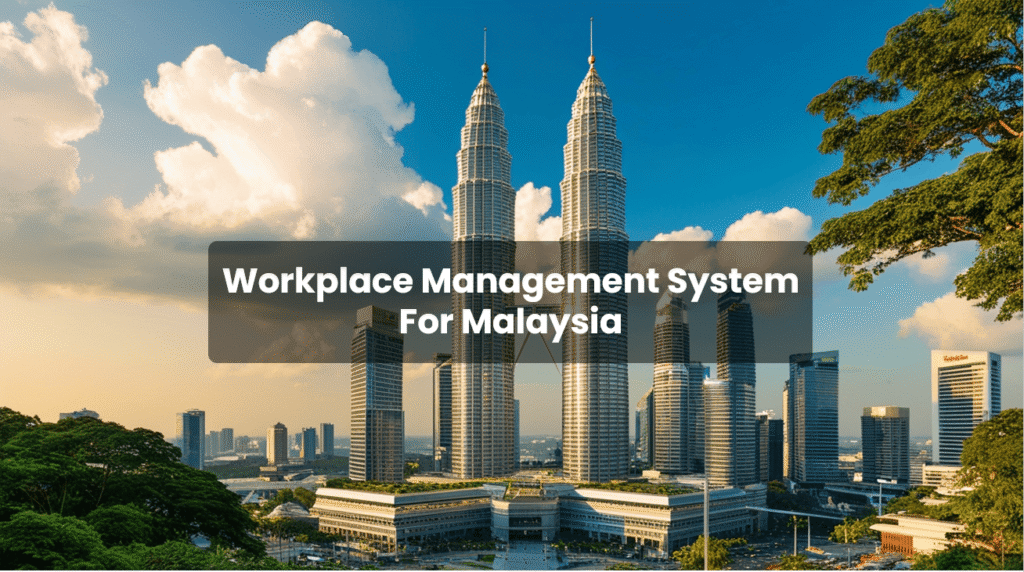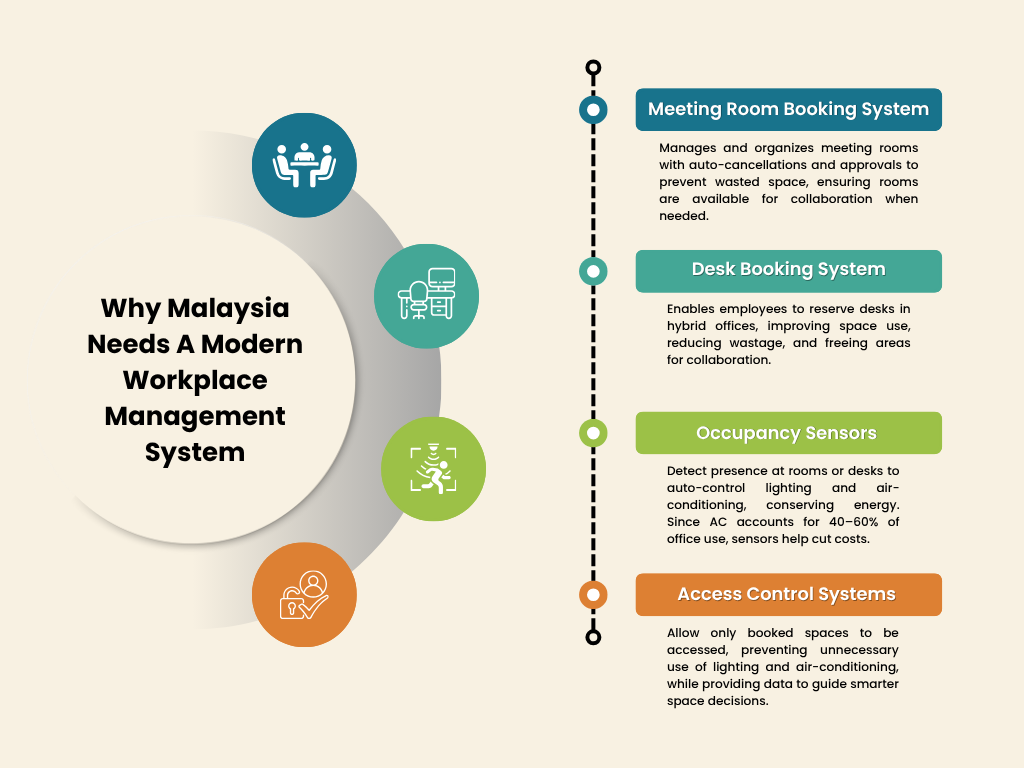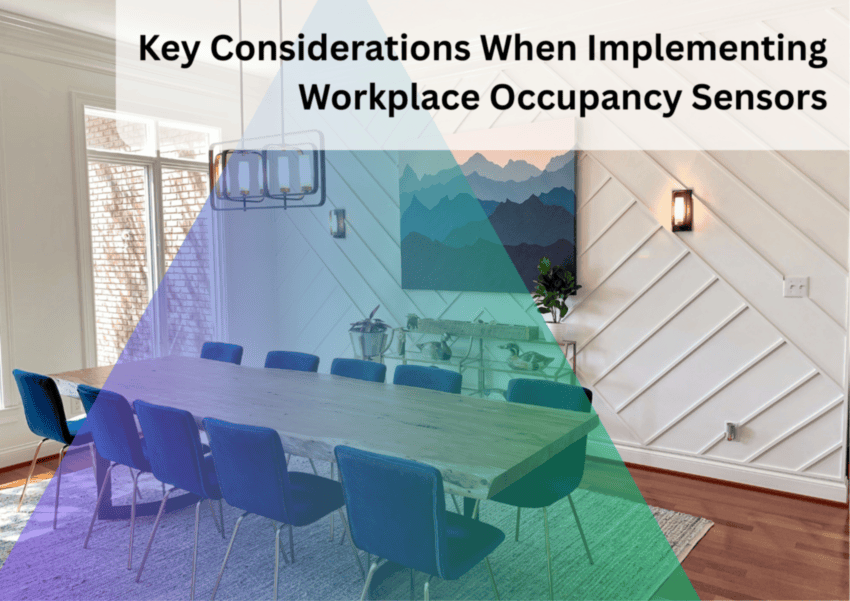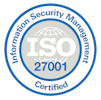Introduction
The workplace of Malaysia is a complex and interesting dynamic. Kuala Lumpur’s office market is a tale of two cities: a bustling hub of new, gleaming towers standing alongside established, older commercial spaces. While overall vacancy rates might seem high, a closer look reveals a fierce “flight-to-quality” – a dynamic shift where companies are flocking to modern, green, well-designed, and amenity-rich buildings.
In this rapidly transforming environment, how can Malaysian businesses, particularly in KL, not just survive but thrive? The answer lies in smart workplace management systems for the Malaysian office.
Let’s dive into how various factors that affect businesses from a workplace perspective and how these drive the adoption of modern technologies that can optimize the workplace by maximizing the utilization, combating rising operational costs, attracting talent, and empowering their workforce.
Drivers of The Modern Workplace In Malaysia
Malaysia is a vibrant economy with a complex mix of small and medium-sized businesses, startups, and large local and multi-national corporations. The need for office space is increasing as more multinationals set up their offices in the country.
Malaysia also possesses a unique blend of workplace habits and culture.
According to WorkBuddy, more than 70% of companies have adopted a hybrid work culture, with 72.7% of Malaysian firms offering a flexible model. Flexible work arrangements are also preferred by most employees, giving them freedom to work anywhere, anytime.
Organizations like PETRONAS, MayBank, and Shopee have established flexible policies that have become a benchmark against which other companies compare and compete.
Employees demand a more conducive working environment with aesthetics, ambience, and collaboration at the top of the list, including work-life balance. This is evident from the increasing demand for co-working spaces that are sprouting across the country.
Given these drivers, companies are rushing to rent out Prime Grade A office spaces, resulting in high occupancy rates. Prime office rents in central Kuala Lumpur averaged RM6.02–RM6.69 per sq ft per month in Q2 2025, marking a year-on-year increase of 2.6% and a 0.2% rise quarter-on-quarter. As of mid-2025, prime Grade A office buildings in KL have occupancy rates ranging from approximately 76% to 77%.
Meaning, there is increasing demand for buildings that are modern, tech-enabled, with amenities and designs that attract and encourage employees to work from the office.
At the same time, electricity rates are increasing fast with the revised tariff structure. This means an increase of 14.2% over a year ago, which can eat into the company’s bottom line.
Finally, the push for sustainable development focuses on offices and buildings meeting ESG guidelines set by the government. For example, IGB Commercial REIT’s buildings with GreenRE Gold certification enjoy occupancy averaging 77.8% in Kuala Lumpur City Centre and up to 93.5% in Mid Valley City, supporting rental growth.
All these factors require that companies look into how well their office space is being used.
Smart Workplace Management System
To address these challenges, companies need to rethink and redesign their workplace environment strategically to not only impact the bottom line but also improve brand presence and attract top talent.
ecobook, as a workplace management system, provides a comprehensive overview of the office workplace and provides insights and analytics to measure optimal usage while providing the needed productivity boost to the occupants.
A smart workplace management system has the following features:
- Meeting Room Booking System – a system that can manage, organize meeting rooms, and take proactive steps to ensure space is not wasted via auto-cancellations, approvals, and other business rules. By conserving wasted spaces, the same meeting room can be used by others to collaborate instead of having to waste time and effort looking for a new space.
- Desk Booking System – that provides an open seating area for hybrid work environments with a one-to-many seating capability instead of a one-to-one basis. A desk booking system allows employees to book desks when they want to come to the office and then check in to their desks when they arrive. This allows for better use of desks while eliminating wastage. Offices can reduce their desk capacity while re-purposing the space for collaborative work environments such as discussion areas and breakout spaces.
- Occupancy Sensors – that detect the presence of persons in a meeting room or desk and perform interactive triggers of lighting and air-conditioning to conserve energy. Sensors can detect presence and thereby turn on/off the lighting and air-conditioning. This can conserve energy usage in the office. According to statistics, nearly 40-60% of energy consumption in office space is due to air-conditioning.
- Access Control Systems – provide the capability to only allow booked spaces to be accessible by the requestors and prevent unnecessary usage of lighting and air-conditioning of meeting spaces without a valid reservation. This can help tie actual usage to consumption, providing insights that management can use to make more informed decisions on office space needs.
Concluding
The Malaysian workplace environment is undergoing a rapid transformation driven by a combination of environmental factors, policies, and employee demands. With the right workplace management system in place, companies can better manage their office portfolio. A workplace management system can help reduce energy usage, increase space utilization and occupancy, while improving the productivity and well-being of its occupants.







